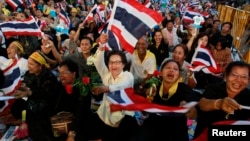BANGKOK —
An amnesty bill passed by Thailand’s lower house of parliament Friday is raising fears that it could pave the way for the return of controversial former Prime Minister Thaksin Shinawatra who has been living in exile. The legislation, if approved by the Senate and cleared by courts, would grant amnesty to many involved in the country's political turmoil over the past decade.
Thousands of supporters of the opposition Democrat Party held protests across Bangkok Friday to denounce the bill passed by the governing Pheu Thai Party early. Opposition members of parliament had boycotted the vote.
The Thai government says the bill is vital for fostering political reconciliation after more than a decade of political conflict. The legislation, which next goes to the upper house, the Senate, grants amnesties to all those involved in the sometimes violent and deadly protests and rallies from 2004 through August of this year.
Political conflicts have deeply divided Thailand since 2005. The split is largely between supporters of former Prime Minister Thaksin Shinawatra and a broad-based opposition including the Democrat Party.
Opposition and business groups say the legislation will undermine the rule of law. Family members of the more than 90 people who died in the political violence say that it prevents them from holding those responsible accountable.
Kraisak Choonhavan, a Democrat Party member, said the law, backed strongly by the party of the former prime minister, clearly favors clearing him of many legal challenges.
"If you pass the bill it does not mean at all that people that have been arrested or remain arrested, or cases are still going to court will necessarily get amnesty because it's such a shoddy job," he said. "What they want is just to have a very wide interpretation of amnesty in order to benefit one person -- and that is Thaksin Shinawatra."
Thaksin, a billionaire turned politician built support among the rural regions and urban and middle working class. But he has been accused of corruption and abuse of power. He was ousted in a coup in 2006, and fled into exile in 2008 to avoid a two year jail sentence for corruption. In 2010 the Thai Supreme Court seized $1.5 billion of Thaksin's assets, saying he illegally gained them while in power.
Chris Baker, an author and commentator on Thai politics, said the Thai Government, currently led by Thaksin's younger sister, Yingluck Shinawatra, appears confident that the bill will survive legal challenges and street protests.
"It will certainly be challenged," Baker said. "People will launch court cases saying this was unconstitutional because of the way it was changed and there will be people on the streets. Obviously Thaksin and company have made a calculation they could tough it out because the demonstration recently have been pretty miniature. I think it's a question of what will happen."
Yingluck Shinawatra, has presided over a largely stable government since her party swept elections in 2011. But her government is facing mounting pressures from protests and legal challenges to its legislative initiatives. Analysts say the party could call for elections in early 2014 in a bid for a renewed mandate.
Thousands of supporters of the opposition Democrat Party held protests across Bangkok Friday to denounce the bill passed by the governing Pheu Thai Party early. Opposition members of parliament had boycotted the vote.
The Thai government says the bill is vital for fostering political reconciliation after more than a decade of political conflict. The legislation, which next goes to the upper house, the Senate, grants amnesties to all those involved in the sometimes violent and deadly protests and rallies from 2004 through August of this year.
Political conflicts have deeply divided Thailand since 2005. The split is largely between supporters of former Prime Minister Thaksin Shinawatra and a broad-based opposition including the Democrat Party.
Opposition and business groups say the legislation will undermine the rule of law. Family members of the more than 90 people who died in the political violence say that it prevents them from holding those responsible accountable.
Kraisak Choonhavan, a Democrat Party member, said the law, backed strongly by the party of the former prime minister, clearly favors clearing him of many legal challenges.
"If you pass the bill it does not mean at all that people that have been arrested or remain arrested, or cases are still going to court will necessarily get amnesty because it's such a shoddy job," he said. "What they want is just to have a very wide interpretation of amnesty in order to benefit one person -- and that is Thaksin Shinawatra."
Thaksin, a billionaire turned politician built support among the rural regions and urban and middle working class. But he has been accused of corruption and abuse of power. He was ousted in a coup in 2006, and fled into exile in 2008 to avoid a two year jail sentence for corruption. In 2010 the Thai Supreme Court seized $1.5 billion of Thaksin's assets, saying he illegally gained them while in power.
Chris Baker, an author and commentator on Thai politics, said the Thai Government, currently led by Thaksin's younger sister, Yingluck Shinawatra, appears confident that the bill will survive legal challenges and street protests.
"It will certainly be challenged," Baker said. "People will launch court cases saying this was unconstitutional because of the way it was changed and there will be people on the streets. Obviously Thaksin and company have made a calculation they could tough it out because the demonstration recently have been pretty miniature. I think it's a question of what will happen."
Yingluck Shinawatra, has presided over a largely stable government since her party swept elections in 2011. But her government is facing mounting pressures from protests and legal challenges to its legislative initiatives. Analysts say the party could call for elections in early 2014 in a bid for a renewed mandate.









